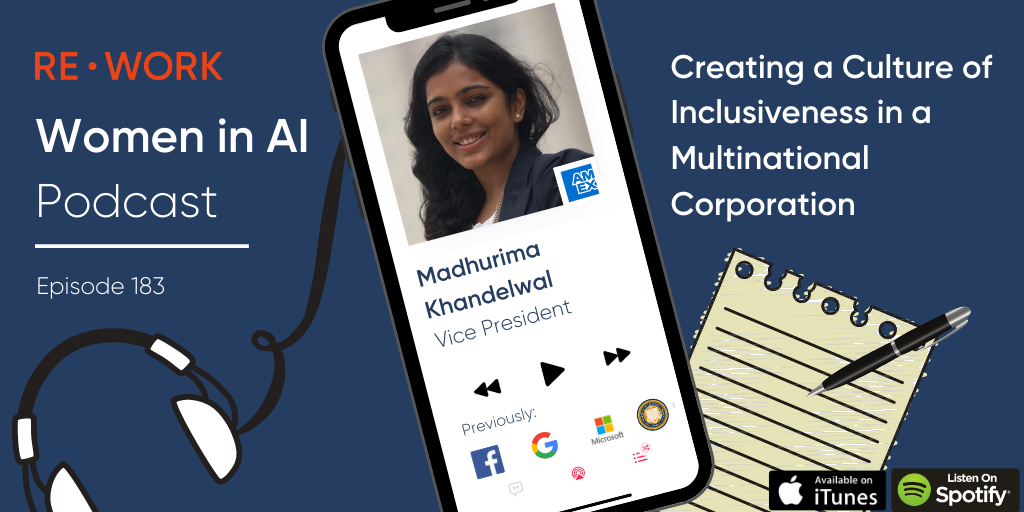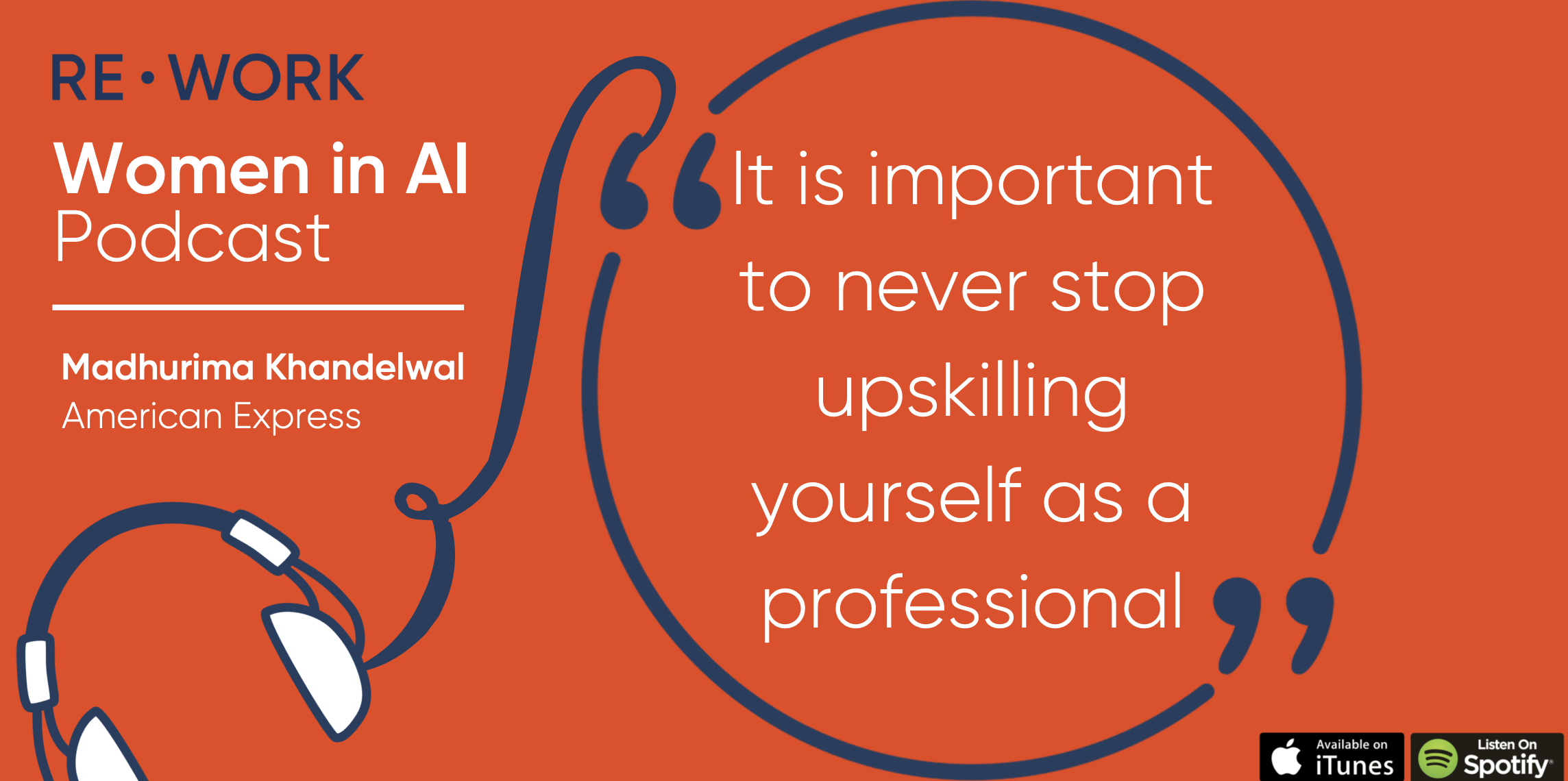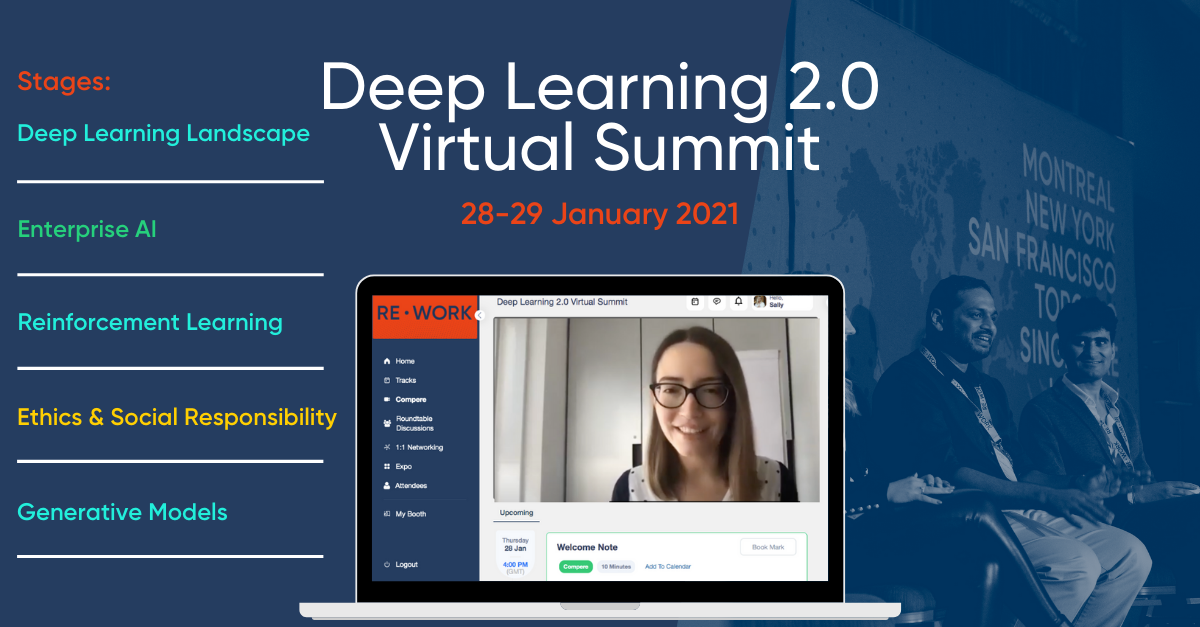This is an interview transcript from our Women in AI Podcast, with Madhurima Khandelwal, Vice President and Head of American Express AI Labs within Enterprise Digital & Analytics, with her team based in Bangalore and New York.
In this role, she leads the charter to build and drive state-of-the-art AI capabilities and solutions to solve high-impact and complex business problems for the enterprise. Madhurima is a flag-bearer of Inclusion & Diversity for Amex and is passionate about creating a culture of inclusiveness and empowerment for all her colleagues.
Topics explored include:
- Madhurima’s Progression Into Vice President and Head of Amex AI Labs
- How Amex Uses AI & ML
- The Impact of COVID-19 on the Dynamic of Work
- The Important Things to Remember in Your Career Progression
- How Amex Has Created a Culture Inclusiveness Workforce
- Challenges Women in AI Practitioners Face
- Advice for Those Starting up in AI
🎧 Listen to the podcast here

Nikita RE•WORK [0:48]
Hi Madhurima, it's fantastic to have you join us for the RE•WORK Women in AI Podcast today. I firstly, wanted to get started exploring a bit more information about your current role. At the moment, you're head of AI Labs at American Express. I wondered if you could share a bit more about the course of your career at American Express and also your progression in to this current role.
Madhurima [1:17]
Thank you, Nikita, for having me today. And for everyone who's listening to me, I hope you're doing well and I hope your loved ones are keeping safe. As for myself, I'm currently the Vice President and the Head of AI Lab within American Express Enterprise Digital & Analytics Vertical. In this role, I lead the charter to build and drive state-of-the-art AI capabilities and solutions. We solve high impact complex business problems for the enterprise. And my teams are based both in Bangalore and New York. What I absolutely love about my role is that we are a group of specialists in our own domains. When we are building products, specialists from each area come together to complement one another, and what we end up building is the industry best. While there's an opportunity to keep getting better at what we do, there's also an opportunity to learn from others in a way that makes you a better professional. I can't believe that I'm at my 15th year in American Express, Amex really promotes career adventure. I've had a lot of roles within this tenure with increasing responsibilities. I actually started as a business analyst back in 2005, with marketing and customer analytics, where I built traditional models to support customer campaigns. I then took on the role to lead channel analytics, and finally customer enterprise data science. But I delivered impactful business outcomes in an enterprise role, applying AI & ML techniques to power personalization on our digital assets, and across a variety of content types. I think what you'll notice here is common, which is, I have taken up rules which needed redefinition or were technically unchartered in nature. But I've always felt supported in every step of my career to pursue these new opportunities.
Nikita RE•WORK [3:21]
It sounds like quite a journey that you've had in those different roles and through that progression. And can you share perhaps a bit more about what you're currently working on at Amex AI labs? And also, specifically, how does Amex use AI and machine learning?
Madhurima [3:39]
Sure, absolutely. Data Science Innovation in American Express is very integrated into every step of the customer journey. In fact, we are aimed at providing world-class customer service. AI lab steam provides sophisticated ML tools for the entire company, and that helps adoption but also ensures responsible use of AI and ML at every touchpoint. Let me give you an example. What we've been working on today, and I'll also touch upon what American Express has been working on in the AI space. For Amex labs, as such, we have begun integrating AI into operational functions to speed up manual processes and allow our colleagues to focus on deeper analytics and more complex stuff. This is all in the space of automation and AI. As an example, we've developed an internal tool that enables our window management team to digitize and review the matching of invoices to identify potential duplicate payments with greater accuracy. You can only imagine how much time a human would take the manual hours doing this kind of checks. For American Express usage of AI, I'll switch gears and talk about natural language processing models, which are integrated into our message as a feature within the Amex app, that leverages the latest and greatest of deep learning algorithms and bolstered by active learning. This technology actually allows Amex to resolve customer needs as quickly as possible. It's the human-assisted AI which enables to answer customer questions quickly and effectively. It's not a standalone bot, this is AI and humans working in concert. Automation is used where relevant and only when appropriate. I will talk about something very close to what I was doing in my previous role, which was all about personalization. I was working on meeting the evolving needs of our customers in real-time, we were delivering messages and offers that were valuable to them in the right, Amex own channel, be at the website, mobile app, or email. We use data from our integrated network, advanced machine learning techniques, and unique channel-agnostic architecture to deliver a highly targeted and personalized message to customers. I guess in this day and time, all our customers need that personalization, and we were able to make a huge impact on our overall engagement with our digital assets.
Nikita RE•WORK [6:24]
I think that just highlights really how integrated AI is in almost every aspect of the workplace at the moment. If possible, I know this is, sometimes, a very difficult question. But what does a typical working day look like for you?
Madhurima [6:42]
You're right, that is a tough one, I guess, you know, every day is quite dynamic, and it's ever-changing. So they don't typically follow the same format, but my focus area does follow. And I'm constantly connecting with my team on project deep ties, brainstorming, one on ones, and also communicating with my stakeholders. But I'll tell you one thing that remains constant in my schedule, which is the quality time I spend with my family, I have literally carved out time on my calendar every day to have lunch with them, as well as visit the park with my two daughters. This time is not available in terms of business meetings, and it allows me to strike that much-needed balance between personal and professional lives.
Nikita RE•WORK [7:30]
Definitely, and that ties into what I wanted to touch on next. Which is looking at how we're all currently working from home. We both are recording this podcast at the moment and really how COVID-19 has changed the dynamic of work and the workplace as well. What impact has that had for you?
Madhurima [7:56]
I guess I will first talk about how that is having American Express shift gears in terms of what we focus on, and then I'll definitely talk about personally, what this pandemic is resulting in the work format. So during this pandemic or COVID-19, Amex definitely has doubled down on strengthening our support for our customers. We are pointing them towards a financial risk program if they need our support. We're also promoting Benefits Services regards to our premium card products, membership rewards, and all the accelerating, increasing access to our digital channels for sale servicing and membership benefits. Our approach and strategies are actually evolving. But our commitment to servicing and serving the needs of our customers is unwavering. I can tell you in my role, it is the prime time for AI solutions and automation, as the need for relevant efficient solutions is ever increasing. But from a personal standpoint, I'm now a virtual leader. And my approach to leadership has shifted to accommodate this change. We have to double down on being organized, on outrightly prioritizing, so that we can make time and we can make room for the much-increased ask of us. It's also important to recognize that people may not behave or react in ways that typically do in our new normal. So I'm always keeping that in mind as well when I manage my team.
Nikita RE•WORK [9:35]
Definitely, I think that's very relevant for anyone listening to this podcast. And in terms of our listeners, quite a few of them are at the beginning of their career in AI. And also at the moment, we have had contact with quite a few of our community that is looking to get into AI perhaps due to our career change that's been prompted by COVID. So I just wanted to ask if you could share a bit more about what's been the most important things for you in your career progression?
Madhurima [10:08]
I think throughout my career, Nikita, I've realised the value in creating a brand for yourself is really important, and really taking that time out to invest in what you stand for, and who you want to be. And to put this in action, I recommend going really deep into what you do, really knowing the elements of work to the tee, and not being afraid to commit yourself to your craft. It's important to never stop upskilling yourself as a professional, we really are living in that dynamic space when it comes to AI. And it also allows you to really hone in your expertise and strengths in every opportunity that you tackle.
Nikita RE•WORK [10:52]
Definitely, that's some great advice there. And now moving on to something that I know that you're quite passionate about, and that's creating a culture of inclusiveness at Amex. Can you share a bit more about your work in that area? And also, what does it mean to you?
Madhurima [11:11]
Absolutely, I think we could have a chat dedicated to just that on that topic. It's really important. It's really important to me to create a culture of inclusion and empowerment for our colleagues across teams at American Express. You know, I've been leading inclusion and diversity for the EDA organisation for a number of years now. And I'm also a core committee member of American Express India, Inclusion & Diversity Council. I'm passionate about increasing engagement efforts and ensuring everyone feels valued in the workplace by thinking about inclusion, diversity in every initiative. I think inclusion, in its core sense, is really about making somebody feel that you belong, and for somebody to realise their potential, that's really at the heart of it. And a few examples I could quote from this initiative within American Express. The first one that comes to my mind is this initiative, we call it Hobby Lobby clubs. And these clubs are basically groups of people coming together with similar interests. And these interests could be travelling, reading, cooking, as an example, to get to know each other outside of your department, and also foster collaboration and inclusivity. We've seen this translate into a higher degree of engagement. Another initiative is open circles. These are small cohorts for experiences sharing with one another and having very candid conversations on a particular theme. We started with women only, but faced with huge demand, we actually opened it up to all colleagues within American Express India. The third one I'll talk about is upskilling programmes. This one is close to my heart. It offers opportunities for people to learn new skills continuously, and also contributes towards new projects.
Nikita RE•WORK [13:11]
I think those different ideas that you've shared, would be relevant for almost any industry or organisations. So there are some great initiatives there that perhaps some of our listeners can tap into as well. And kind of moving more on towards really, the focus of this podcast, which is women in AI, and what are your thoughts on the challenges faced by women as AI practitioners, such as yourself?

Madhurima [13:41]
I'm so glad you asked me that question, Nikita. I think one of the biggest challenges I have faced or that have talked to other women in this field about, is really the hesitation that comes with making a big career move, especially when pursuing a role in an unchartered territory or changing career focus. I think my advice for women in AI is just to push yourself, go, and take the risk. That is why it's so important to have programmes in place where female professionals can connect and have trust and support in the workplace. Another challenge with AI specifically I feel is the pace at which technology moves. You know, more often than not, when a woman returns from maternity, she comes back to projects which have either long gone, completed or new projects have now come into place. To support women in AI roles I would really ask AI leaders out there to offer upskilling programmes to keep up with the fast pace of the profession. Also, provide flexibility for women to balance multiple roles within their professional and personal lives.
Nikita RE•WORK [14:56]
And I think some of those points, so push yourself, take risks, make connections, be flexible, those that are so important and more so than ever now, when things are constantly changing. Well, thank you so much for that advice that you've shared today. Some really interesting topics and things that we can, I think, perhaps reflect on and potentially anyone listening could utilise in their organisation or their role as well. So finally, I just wanted to ask if any of our listeners are keen on connecting with you or finding out more about what you do, what's the best way for them to contact you? Would it be connected via LinkedIn? Or what would you advise?
Madhurima [15:41]
Yeah, absolutely. I think any channel preference, LinkedIn, definitely. But even my email, whatever people find their right channel of choice. Remember, I was in the space of personalization so I really believe in whatever is relevant for you, I just want to make that available. So LinkedIn or email, definitely.
Nikita RE•WORK [16:04]
Perfect. We'll connect your LinkedIn profile in the notes, once we share the podcast. So thank you, again, Madhurima. It's been a real pleasure to hear more about your work and about some of your passions in really important areas such as inclusiveness within AI, which is something that we're all working towards all of our listeners especially. So it's been great to have you involved. And I hope you and your family kind of look after yourself. And we'll speak to you again soon.
Madhurima [16:32]
Thank you so much, Nikita. Thank you for having me here. It was definitely an absolute pleasure for me.
Nikita RE•WORK [16:39]
Thank you again to Madhurima for taking the time out of her busy day to have a chat with us for this week's podcast. It was really insightful to hear more about the initiatives she's helped put in place at Amex, to encourage more inclusiveness and department. Until next time, take care.

Further reading - Experts Blogs & More
Female Pioneers in Computer Science You May Not Know - Part 2
AI Experts Talk Roadblocks in AI
Experts Predict The Next AI Hub
The AI Overview - 5 Influential Presentations Q3 2020
13 ‘Must-Read’ Papers from AI Experts
‘Must-Read’ AI Papers Suggested by Experts - Pt 2
10 Must-Read AI Books in 2020 - Part 2
Change Detection and ATR using Similarity Search in Satellites
Top AI Resources - Directory for Remote Learning
Top AI & Data Science Podcasts
30 Influential Women Advancing AI in 2019
30 Influential AI Presentations from 2019
AI Across the World: Top 10 Cities in AI 2020
Female Pioneers in Computer Science You May Not Know
Top Women in AI 2020 - Texas Edition
2020 University/College Rankings - Computer Science, Engineering & Technology
